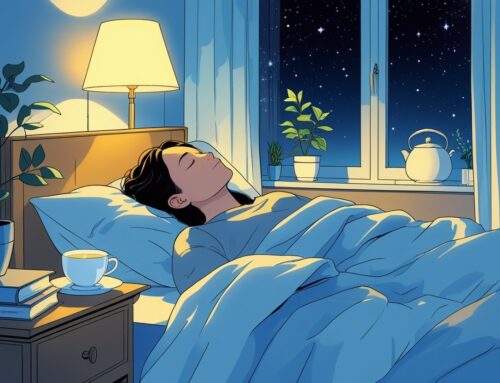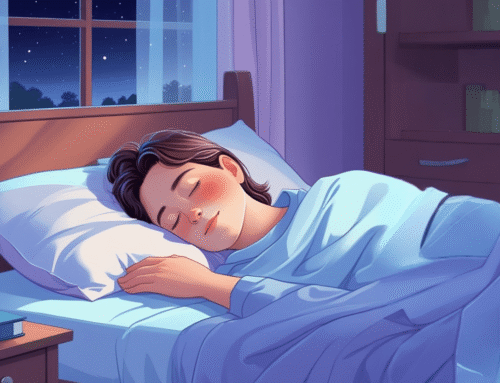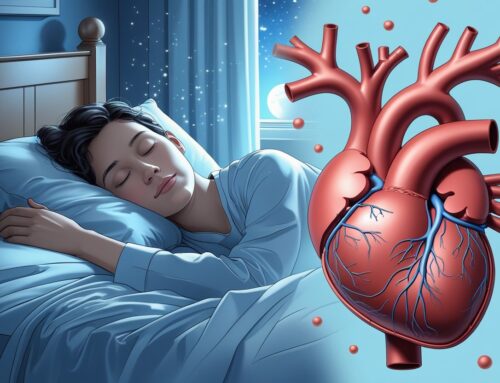Not getting enough sleep has serious effects on both the mind and body. After 24 hours without rest, a person may face symptoms such as slower reaction times, poor judgment, and increased anxiety. These issues tend to intensify with prolonged wakefulness, which can turn even simple tasks into overwhelming challenges.
Sleep loss disrupts cognitive function and emotional balance. After a full day without sleep, someone may feel irritable and confused, which makes decision-making more difficult. Recognizing these effects reinforces the critical role of sleep in supporting mental health and physical well-being.
The desire to stay awake longer might appear harmless at first, however, the consequences of sleep deprivation highlight the necessity of proper rest. Many people overlook how essential sleep is to sustaining both health and productivity.
Key Takeaways
- Sleep deprivation affects reaction time and decision-making abilities.
- Staying awake for 24 hours can cause increased anxiety and irritability.
- Recognizing the impact of sleep loss is essential for maintaining overall health.
- Poor support from your mattress can cause back pain, which can lead to frequent wake-ups and even more sleep loss over time.
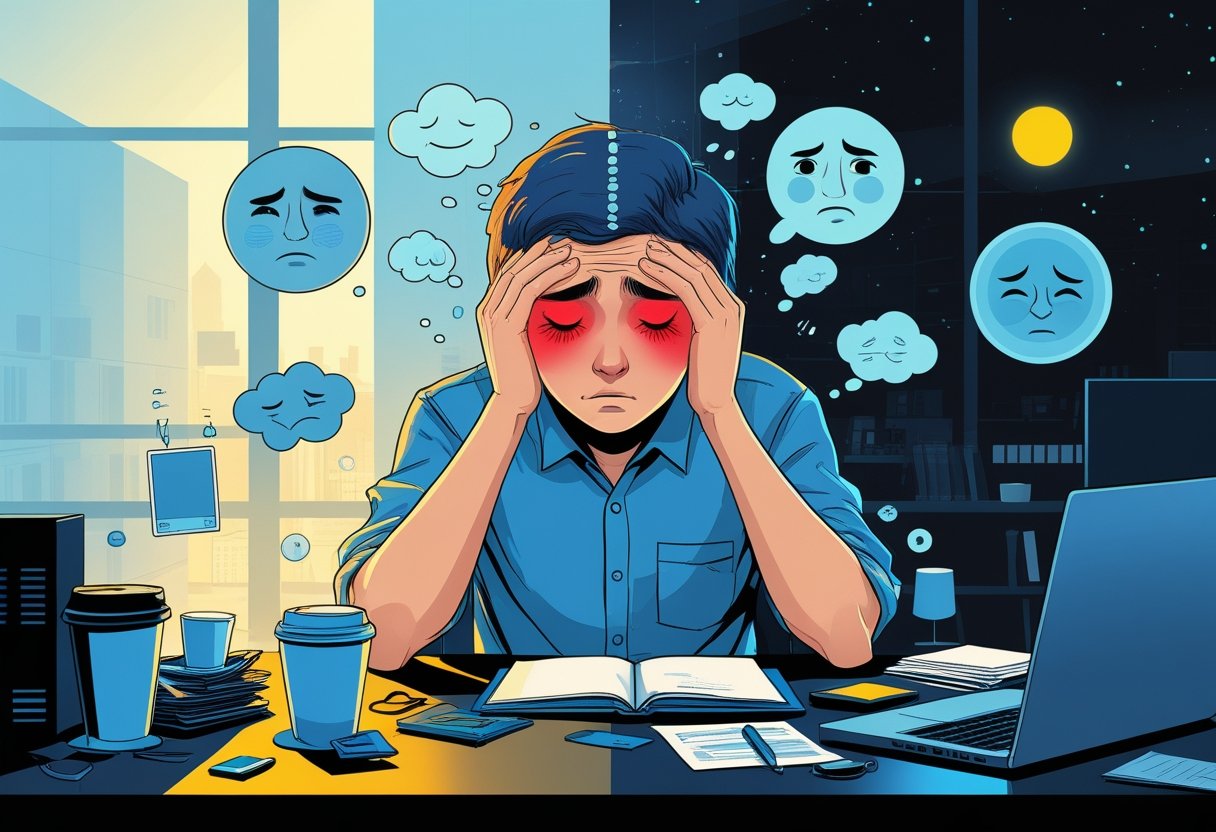

Sleep is a complex process that affects both physical and mental health. Understanding how it works provides insight into the consequences of sleep deprivation. This section explains circadian rhythms and the sleep-wake cycle, which play a vital role in regulating sleep.
Circadian Rhythms and Sleep Regulation
Circadian rhythms are natural cycles that follow an approximately 24-hour pattern. They regulate the sleep-wake cycle as well as other bodily functions. External cues like light and temperature influence these rhythms.
The body’s internal clock tells you when to feel alert and when to rest. Melatonin, a hormone produced in the brain, signals that it’s time to sleep. As night approaches, melatonin levels rise and trigger drowsiness. When someone stays awake despite these signals, this balance becomes disrupted. Long-term disruption of circadian rhythms can lead to serious health problems and shorten the amount of time a person can stay functional without sleep.
The Sleep-Wake Cycle
The sleep-wake cycle includes multiple stages: light sleep, deep sleep, and REM sleep. Each stage plays a specific role, such as physical recovery or memory consolidation. Most adults require 7 to 9 hours of sleep each night.
Lack of sleep impairs cognitive functions like judgment and memory. After about 24 hours without rest, reaction times slow, and accuracy declines. Research shows that extended sleep deprivation can result in serious physical and mental health consequences. Regular sleep remains essential for overall well-being.

Staying awake for 24 hours leads to a range of negative effects on both body and mind. These consequences disrupt cognitive function, emotional balance, and physical health. Recognizing these outcomes is essential for anyone thinking about pulling an all-nighter.
Cognitive Function Impairment
Going without sleep for 24 hours causes a noticeable decline in cognitive abilities. Common effects include:
- Drowsiness: Extreme fatigue reduces alertness and slows reaction times.
- Impaired Judgment: Making decisions becomes harder, and accurately assessing situations becomes a challenge.
- Memory Loss: Short-term memory often falters, which makes recalling information or learning new tasks more difficult.
These impairments affect daily activities like driving or studying and can make them both dangerous and inefficient. Research indicates that sleep deprivation lowers focus and concentration, disrupting tasks that demand sustained attention.
Emotional and Psychological Effects
Sleep loss also disrupts emotional regulation and mental well-being. People may face:
- Irritability: Mood swings and frustration tend to increase.
- Anxiety and Stress: Stress levels rise as the body responds to exhaustion.
- Depressed Mood: Feelings of sadness can develop, reducing motivation and affecting one’s general outlook.
This emotional instability may harm relationships and lead to social withdrawal or misunderstandings. Noticing these changes is important for those who go without sleep, as meeting sleep needs supports emotional resilience.
Physical Health Implications
After 24 hours without sleep, the body begins to show signs of physical strain. Notable effects include:
- Increased Pain Sensitivity: The body responds more intensely to pain.
- Impaired Immune Function: A weakened immune system increases vulnerability to illness.
- Increased Appetite: Sleep loss often triggers hunger, which can lead to unhealthy eating habits.
Avoiding these health issues requires prioritizing quality sleep. Understanding how sleep deprivation affects the body and mind underscores the vital role of rest in maintaining well-being.
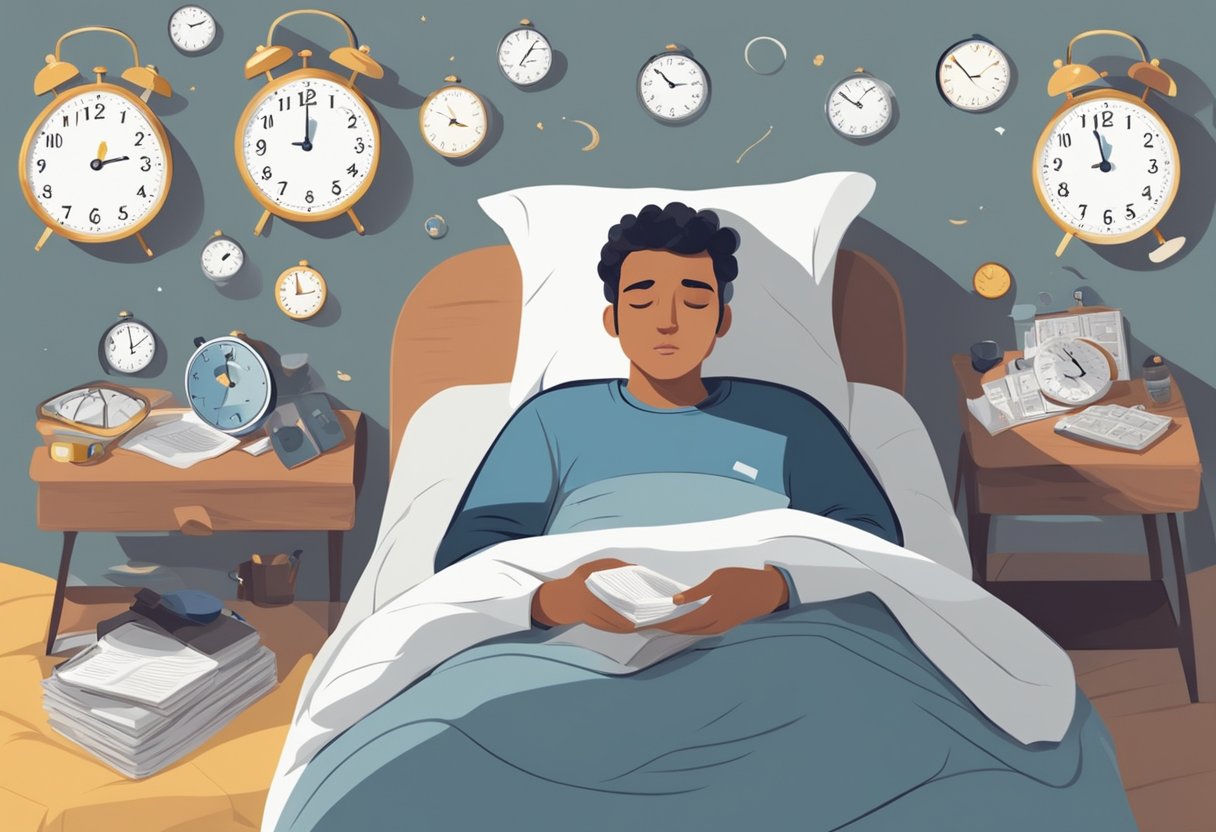
Sleep debt occurs when a person consistently gets less sleep than their body requires. Missing sleep repeatedly leads to an accumulation that can trigger various health issues, which affect both physical and mental well-being.
Accumulation and Compounding Effects
Missing 24 hours of sleep can cause immediate effects. The brain begins to show signs of dysfunction, which impairs decision-making and reduces focus. Over time, sleep debt adds up. For example, losing just one hour of sleep each night adds up quickly.
Consistently losing sleep results in significant sleep debt. Studies show that recovering from one night of missed sleep may take up to four days. The impact intensifies with each additional night of inadequate rest. The body and mind recover slower than most expect.
Recovery from Sleep Deprivation
Repaying sleep debt requires more than one solid night of rest. Experts emphasize the importance of consistent sleep schedules to restore balance.
Sleep debt also limits how long someone can function without sleep. While some may stay awake for a couple of days, going beyond that point introduces serious health risks. Prolonged sleep deprivation can cause hallucinations, cognitive decline, or worse.
To recover, individuals must focus on quality sleep instead of merely increasing hours. A healthy sleep environment and regular sleep schedule offer the best approach for managing sleep debt and supporting overall well-being.
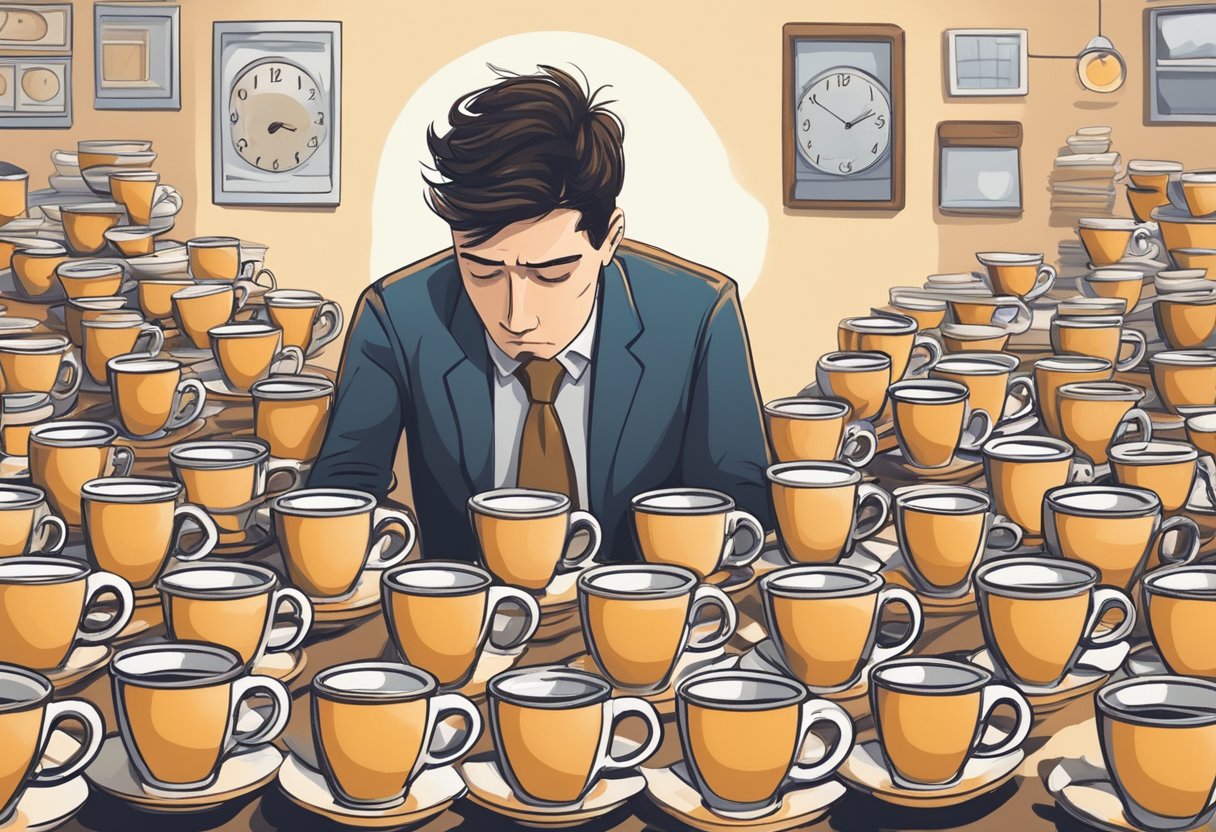
Extended wakefulness leads to significant health issues. The impact on mental and physical well-being worsens as hours without sleep increase. Short-term effects often appear immediately, while long-term consequences develop gradually and compromise overall health.
Short-Term Health Risks
After 24 hours without sleep, individuals may experience cognitive impairments such as difficulty concentrating, poor judgment, and slower reaction times. In fact, reaction times slow to a level comparable to alcohol intoxication.
Physical health also declines. Symptoms may include headaches, dizziness, and an increased heart rate. Mood swings and heightened irritability can make social interactions more difficult. In extreme cases, hallucinations may appear after just 48 hours without sleep. One study found that even a single sleepless night can disrupt metabolic processes, triggering increased appetite and cravings for unhealthy foods.
Long-Term Health Consequences
Chronic sleep deprivation carries serious risks. It raises the likelihood of developing conditions like Type 2 diabetes and hypertension. The immune system weakens, leaving the body more vulnerable to infections and illness.
Cognitive functions deteriorate over time. A prolonged lack of sleep undermines memory, learning capacity, and decision-making skills. Those who routinely sleep too little may face an elevated risk of mental health disorders, including anxiety and depression.
Research indicates that individuals deprived of sleep for a week can experience severe mental and physical breakdown. While short-term survival without sleep remains possible, both body and mind require consistent rest to function at their best.
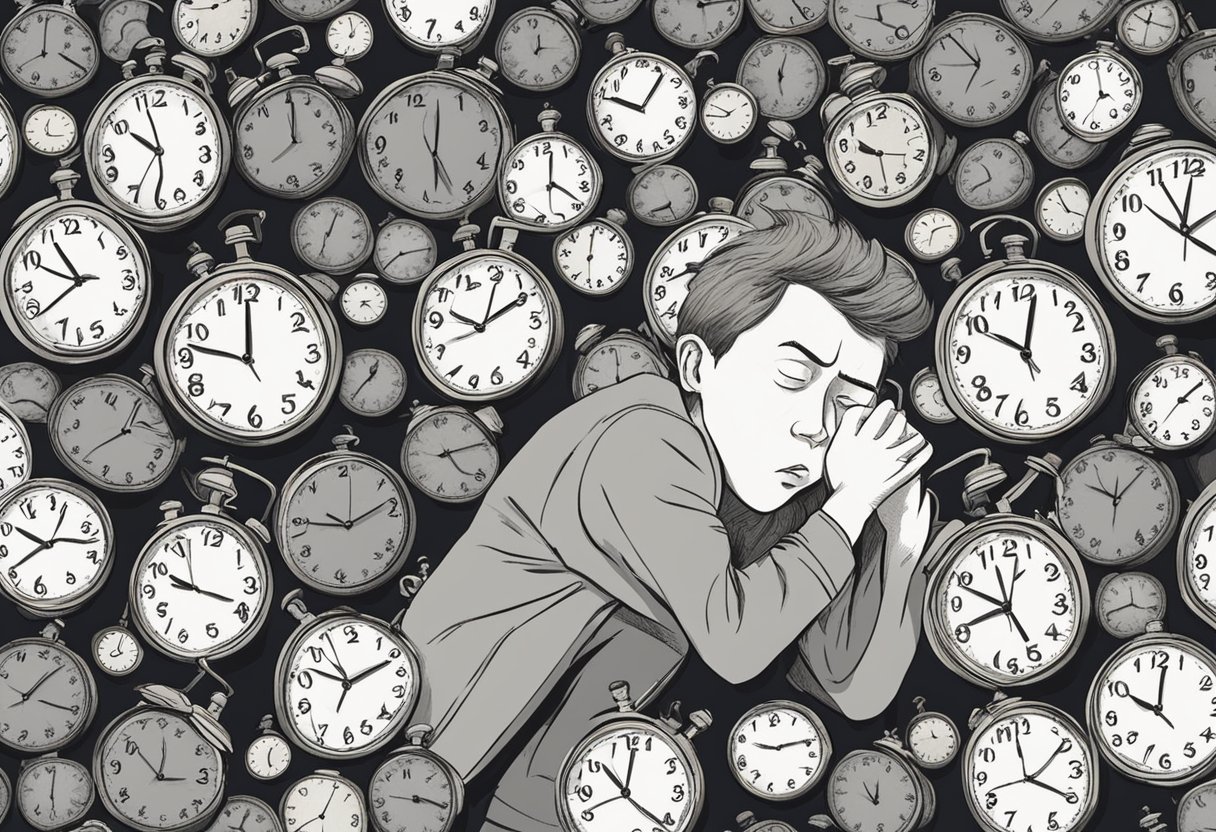
Sleep deprivation can cause serious physical and mental effects. Understanding the limits of how long a person can stay awake offers insight into the body’s needs and capabilities.
Recorded Extremes and Scientific Observations
The longest recorded time a person stayed awake is approximately 11 days. This extreme case of sleep deprivation took place during a world record attempt. Most studies indicate that a typical human can remain awake for about 24 to 48 hours without experiencing significant effects, aside from fatigue and cognitive impairment.
After 24 hours without sleep, individuals often show decreased attention and slower reaction times. Research confirms that the body starts to exhibit symptoms similar to intoxication. If wakefulness continues beyond that, sleep deprivation causes more severe effects on decision-making and memory.
Potential for Harm and Fatality
Although most people manage one night without sleep, the body has limits. Staying awake beyond 48 hours significantly impairs cognitive function. Chronic sleep deprivation contributes to serious health risks, including heart disease, diabetes, and stroke.
In rare cases, extreme sleep loss leads to conditions like Fatal Familial Insomnia, a genetic disorder that ultimately causes death due to the inability to sleep. This underscores the critical role of sleep in maintaining health. A consistent sleep schedule supports both mental and physical well-being.

Occasional sleeplessness affects daily life. Taking action early and using helpful techniques provides support when staying awake for long hours.
Proactive Measures and Sleep Hygiene
Good sleep hygiene plays a key role in overall well-being. Consider these effective practices:
- Create a Sleep Schedule: Go to bed and wake up at the same time each day. This routine supports the body’s internal clock.
- Limit Naps: Skip long naps. If necessary, keep them brief for about 20 to 30 minutes.
- Reduce Screen Time Before Bed: Blue light from screens disrupts sleep. Avoid electronic devices for at least an hour before bed.
- Optimize the Sleep Environment: Keep your bedroom quiet, dark, and cool. Choose bedding that feels comfortable.
Following these practices helps improve the quality of rest when it matters most.
Coping with Sleeplessness: Tips and Techniques
When sleep becomes elusive, these strategies offer practical relief:
- Stay Active: Light physical activity, like short walks or stretches, boosts energy naturally.
- Manage Caffeine Intake: Use caffeine with intention. A small dose promotes alertness, although it’s best to avoid it later in the day.
- Stay Hydrated: Drink moderate amounts of water. Proper hydration supports mental clarity without disrupting comfort.
- Practice Mindfulness or Deep Breathing: These approaches lower stress and support focus without worsening fatigue.
With the right strategies in place, navigating the effects of 24 hours without sleep becomes more manageable.
Noticing the effects of 24 hours without sleep can be alarming. It’s essential to recognize when symptoms point to the need for medical attention.
Warning Signs and Symptoms
After 24 hours without sleep, a person may experience a range of physical and mental symptoms.
Common signs include:
- Extreme Fatigue: Feeling unusually tired or drained.
- Cognitive Issues: Difficulty concentrating, impaired judgment, and slower reaction times.
- Mood Changes: Increased irritability, anxiety, or sudden mood swings.
- Physical Symptoms: Headaches, dizziness, or muscle pain.
If someone stays awake for two days yet doesn’t feel tired, this unusual response may signal that sleep deprivation is already impairing cognitive function. The absence of fatigue does not necessarily mean everything is fine, as it could reflect a more serious underlying issue. Recognizing these signs early helps prompt timely action.
Consulting Health Professionals
Anyone experiencing intense symptoms after 24 hours without sleep should contact a health professional, especially if the condition persists or worsens.
A health professional may examine the following:
- Mental Health Status: Identifying signs of stress, anxiety, or depression that may interfere with sleep.
- Sleep Disorders: Investigating possible conditions such as insomnia or sleep apnea.
- Physical Health: Checking for issues that become worse when sleep is lost.
Getting medical help matters when exhaustion becomes unmanageable. A clear diagnosis and proper treatment plan help restore normal sleep and support long-term wellness. Knowing when to seek professional care ensures better handling of sleep deprivation’s impact.

A mattress affects sleep quality. An uncomfortable mattress can lead to tossing and turning throughout the night, contributing to fatigue and cognitive impairment after 24 hours without restful sleep.
Key Factors
- Firmness Level: A mattress that is too soft or too firm can cause discomfort, which leads to poor posture and back pain.
- Support: A good mattress provides proper spinal support. Insufficient support may result in aches and pains, making it difficult to stay asleep.
- Temperature Regulation: Some mattresses trap heat. A sleeping environment that is too warm can disturb sleep cycles and cause wakefulness.
- Age of the Mattress: An old or worn-out mattress may lose its structural integrity, decreasing comfort and leading to restless nights.
Tips for Choosing the Right Mattress
- Test Firmness: It is essential to try different firmness levels before purchasing.
- Consider Material: Look for materials that provide both comfort and support, such as memory foam or latex.
- Check for Warranty: A warranty indicates quality and assures that the manufacturer stands behind their product.
The Leesa Sapira Hybrid mattress aligns perfectly with the key factors that influence sleep quality. Its relaxed-firm feel offers a balanced level of firmness for maintaining proper spinal alignment and reducing the risk of back pain. The mattress features individually wrapped pocketed coils, which provide targeted support and adapt to your body’s contours, and minimize pressure points and contribute to a more restful sleep.
Additionally, Leesa Sapira Hybrid mattress features a breathable cover and coils for superior airflow. With these elements combined, the Leesa Sapira Hybrid provides the support, comfort, and stability needed to improve sleep quality and prevent sleep loss.
Frequently Asked Questions
Many people wonder about the effects of missing sleep for 24 hours. This section addresses common questions regarding health risks, immediate effects, coping strategies, potential benefits, and differences between short and long-term sleep deprivation.

